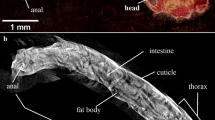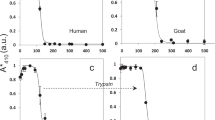Abstract
As reported some months ago1, measurements of the colloid osmotic pressure of the body fluids of marine animals gave results which arranged themselves in the order of phylogenetic development. This fact suggested that there exists a rather close relation between the general organisation of an animal and the colloid osmotic pressure of its body fluids. Such a hypothesis requires further confirmation; there arose, in particular, the important question whether this relation subsists when the organisms compared are living in a different surrounding medium.
This is a preview of subscription content, access via your institution
Access options
Subscribe to this journal
Receive 51 print issues and online access
$199.00 per year
only $3.90 per issue
Buy this article
- Purchase on Springer Link
- Instant access to full article PDF
Prices may be subject to local taxes which are calculated during checkout
Similar content being viewed by others
References
NATURE, 136, 757 (1935). Compt. rend. Soc. Biol., 120, 303, 305 (1935).
Author information
Authors and Affiliations
Rights and permissions
About this article
Cite this article
MEYER, P. Colloid Osmotic Pressure of the Hæmolymphs of some Terrestrial Invertebrates. Nature 137, 401–402 (1936). https://doi.org/10.1038/137401a0
Issue Date:
DOI: https://doi.org/10.1038/137401a0
This article is cited by
Comments
By submitting a comment you agree to abide by our Terms and Community Guidelines. If you find something abusive or that does not comply with our terms or guidelines please flag it as inappropriate.



